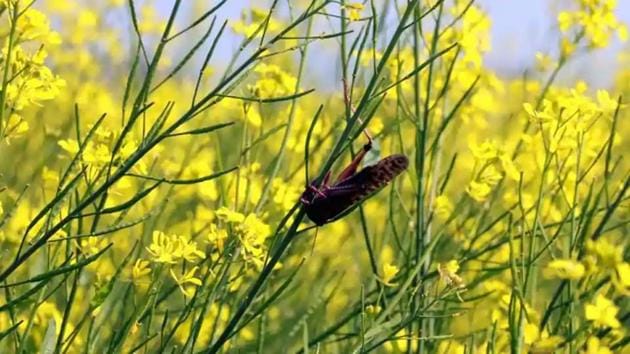Reach of locusts wider due to lack of crops
According to the officials, swarms were now reported from districts such as Bundi, Sikar, Pratapgarh and Chittorgarh, hundreds of kilometres from the border.
Locusts coming from Pakistan to Rajasthan are travelling far and wide into the state because of a lack of crops in fields, officials said on Wednesday.

According to the officials, swarms were now reported from districts such as Bundi, Sikar, Pratapgarh and Chittorgarh, hundreds of kilometres from the border.
“There’s no crop in the fields. Unable to find settling grounds and crops to devour, locust swarms are travelling far in search of food. The insects...fly at the sound of tractors or at sight of light when we launch control operations at night,” said Om Prakash, agriculture commissioner.
Locusts are large grasshoppers with strong flight ability. They are usually solitary, but when there is a significant rise in population, they travel in vast swarms for food, causing extensive damage to vegetation. The species found in India are known as desert locust.
Locust outbreak was reported in Rajasthan in May 2019 after a gap of 26 years and the attack continued until this February, damaging crop on at least 670,000 hectares across 12 districts, according to the state government. The state pegged the loss at ~1,000 crore.
The Locust Warning Organization (LWO) of the Union ministry of agriculture and farmer welfare warned of another attack in May-June 2020. It began in Ganganagar, a north Rajasthan district bordering Pakistan, on May 11. In 2019, the swarms were first spotted in Jaisalmer, another border district.
The agriculture commissioner said locusts generally settle on vegetation after sunset and fly again at around 9-10 am the next day, giving control teams enough time to spray pesticides.
“This year, we are able to launch control efforts only around midnight because they are settling late. The current breed of locusts unsettles on hearing sound of tractors, making our job more difficult. An unsettled swarm is highly mobile and can as much as 150km a day if winds are favourable. These swarms can devour large amounts of vegetation and crops. The saving grace is, there’s no crop. So there’s no damage,” LWO deputy director KL Gurjar said.
Many districts that didn’t report swarms last year – such as Sirohi, Ajmer, Bhilwara, Pali, Pratapgarh, Sikar and Jhunjhunu – are reporting such attacks this year. So far, locusts have been reported from 16 of Rajasthan’s 33 districts.
Officials said the desert locust has always been a major threat and just one small swarm can eat the same amount of crops in one day as 35,000 people. “Currently, they are settling on babool and khejdi trees,” Prakash said. The state agriculture department has controlled the outbreak on around 40,000 hectares, he added.
Agriculture minister Lal Chand Kataria said the state government provided 45 vehicles to LWO for their sprayers and deployed 70 more for field surveys. He said 600 tractor-mounted sprayers were also involved in control operations. “We have also invited bids for drones to spray pesticides in areas inaccessible to the vehicles,” he said.
LWO sprayers can reach up to 7-8 feet from the ground level, and those on tractors go up to 15-20 feet. The department has engaged fire tenders to reach greater heights. “Around 150 teams are working in 14 districts to identify places where control operations need to be launched,” the minister said.
The department, he said, has provisioned Rs 5 crore for vehicles and Rs10 crore for providing plant protection chemicals to farmers at 100% grant.
According to a status report by the Food and Agriculture Organization of the United Nations (FAO), hopper groups, bands, and adult groups are present on the India-Pakistan border on both sides. “Migration from the spring breeding areas in Baluchistan has commenced, and several immature adult groups and swarms have appeared in Rajasthan,” it said in the report published on its website.
FAO has also released a global forecast, which says locust swarms from new areas can also enter the Indian border from June 22, worsening the current outbreak.
Rajasthan chief minister Ashok Gehlot has written to Prime Minister Narendra Modi twice in April and in May to seek the Centre’s help in dealing with locust attacks.






